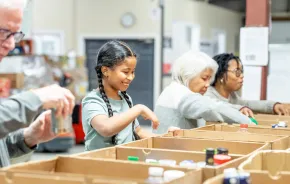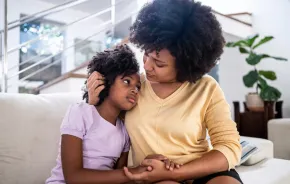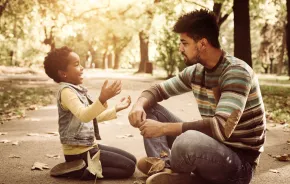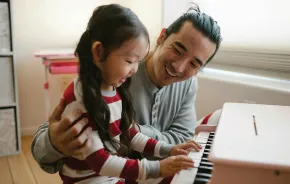 Reminiscing about her childhood, one mom wrote, “We had all kinds of games, playing hard every day after school, every weekend and from dawn until our parents made us come in at dark in the summertime. One game was called ‘chase and run,’ which was a kind of complex, team-based hide-and-seek and tag combination. . . . As with all our games, the rules were elaborate and they were hammered out in long consultations on street corners. It was how we spent countless hours.”
Reminiscing about her childhood, one mom wrote, “We had all kinds of games, playing hard every day after school, every weekend and from dawn until our parents made us come in at dark in the summertime. One game was called ‘chase and run,’ which was a kind of complex, team-based hide-and-seek and tag combination. . . . As with all our games, the rules were elaborate and they were hammered out in long consultations on street corners. It was how we spent countless hours.”
Hammering out elaborate rules in long consultations is also how that little girl spent countless hours as an adult.
Her name is Hillary Rodham Clinton.
If you think back to your own childhood fun, chances are you, too, can see glimpses of the adult you turned into. I was speaking at a convention of early educators recently and asked, “How many of you used to play school?”
It looked like everyone in the auditorium raised her hand. “How many of you played the student?” The hands shot down. They had assumed the teacher role, of course. Still do. (Another story of how free time allows kids to unfurl their imaginations and pursue whatever their hearts desire: I actually spent much of my childhood making pins emblazoned with new words, because I dreamed hard of coining a catchphrase. And guess what? I did: “free-range kids.”)
“The child is father of the man,” wrote William Wordsworth, meaning we pass along the passions and predilections we develop as kids to our adult selves. But Wordsworth was writing long before the era of video games and supervised playdates. Nowadays, between classes, camp, day care, tablets and nannies — which are all fine and good — it’s hard for kids to find the time and space for “free play.” Free play is what kids (or any humans) do for fun when nothing’s riding on it. No one is coaching or keeping score. If they’re lucky, no one is even watching. All we’re doing in free play is what interests us most at that moment — skipping stones, climbing trees, drawing dinosaurs, playing with dolls.
This free play is critical to happiness and even learning. “The drive to play is a basic biological drive,” writes Peter Gray in his outlook-altering book, Free to Learn. Lack of free play doesn’t kill kids, obviously, but quite possibly it “stunts mental growth.” That’s because when kids look like they’re doing nothing — just goofing around with friends or making something without having been assigned a project — they’re really developing all the traits they need to succeed in school and in life.
For instance: When Clinton made those teams for “chase and run,” she was clearly honing her interpersonal skills. But when kids play with other kids, they are also developing their attention to detail (Where does Ava usually hide?), their empathy (I’d better throw the ball softer to little Jacob), their bravery (I hope Ollie doesn’t jump out at me!) and their extremely crucial “executive function” — the ability to control themselves.
Executive function is what teachers are always wishing kids had more of: “Turn around and do your math packet!” How does a child get that kind of discipline? The hardest way is by sitting still in class. The easiest way is by playing a game. Say that it’s Ella’s turn at bat, and she strikes out. It’s not fair, she thinks. The ball was too fast, the sun was in her eyes.
There are a lot of reasons for Ella to feel sorry for herself. She may even be ready to cry or stomp off. But she will often hold herself together for one simple reason: She wants the game to continue. If she leaves, the game is over — for her. And so, because the drive to play is so great, she sucks it up and goes to the back of the line. The word we use for this in the adult world is “self-control.”
Learning self-control is a by-product of free play.
Getting kids to play with each other is something parents usually do by signing them up for a class or program. God knows I spent many hours on the sidelines of kiddie soccer, baseball and basketball “socializing” my kids. But those are sports skills. Missing are all the life skills: how to organize a game (otherwise known as leadership); how to create two roughly equal teams; how to deal with a dispute to everyone’s satisfaction, more or less; how to be good sports without a coach mandating, “Now, everyone shake hands.”
If you can kick your kids outside a fair amount this summer and convince some other nearby parents to do the same, those kids will start to play together. There might be some tears, so do yourself a favor and don’t watch.
Do your kids a favor and don’t watch.
Give them free time for this timeless activity, and they just may thank you forever.











